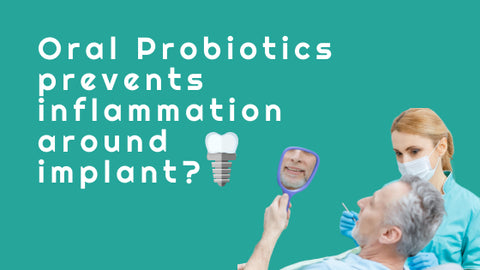Oral Probiotic prevents inflammation around implant?

A study showing that oral probiotic prevents inflammation around implants was published in the SCIE-class international journal Microorganisms.
Mucosal inflammation around the implant is one of the diseases around the implant, which refers to inflammatory lesions that occur in the soft tissue of the implant, that is, gums.
The main cause is poor dental management and the characteristics of tissues around implants that are vulnerable to bacteria.
If it becomes serious, it can expand to inflammation around implants that accompany bone loss. It is known that 50% to as many as 90% of people who planted implants experience diseases around implants.
The results of the study introduced this time are a paper that evaluates how oral probiotics affects the formation of biofilm of harmful bacteria that proliferate on the surface of implants, a company specializing in oral probiotics.
It was conducted from March 2020 to February 2021 as an invitro test.
The oral probiotics strains used are oraCMUTM and oraCMS1TM. Eight types of oral disease-causing bacteria, such as materials used for implants and gingivalis, which cause gum disease, were cultivated on the surface of titanium, and at the same time oral probiotics strains oraCMUTM and oraCMS1TM were added.
Inhibition of biofilm formation was measured to evaluate changes in harmful bacteria after incubation for 3 days. As a result of the evaluation, 99.95% to 99.98% of probiotics, 86.53% to 89.23% of absorbance measurements, 85.57% to 97.13% of qPCR measurements measured by amplifying bacterial DNA, and 82.11% to 99.04% of biofilm formation in confocal laser scanning microscopy.
Mi-sun Kang, director of OraTicx Research Institute, said, "The study is to evaluate the effectiveness of oral probiotics strain oraCMUTM and oraCMS1TM on eight types of harmful bacteria biofilm formed on the surface of implants.", and adding "This suggests that inhibition of the formation of harmful bacteria biofilm in oral probiotics can be used as an auxiliary therapy to prevent mucosal inflammation around implants, and human application tests are needed for more accurate verification," she said.
To read more in Korean: visit Health Chosun News








